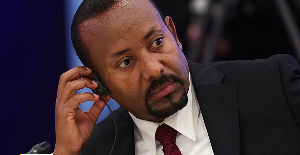The red flag has been raised against corrupt and incompetent judges. A respected lawyer, Nene A.O. Amegatcher, has revealed that about 90 per cent of the judges appointed by government over the past fifteen years are incompetent.
According to him, government tends to appoint judges who crawl under the incompetence of credibility sheets at the Ghana Bar Association (GBA), adding that if appointments were based on merit, many of our judges would not have been appointed. “Sometimes, they are lawyers who do not know their left from right. That is one of the reasons why there are so many adjournments of cases and miscarriage of justice,” he stressed.
Nene Amegatcher was responding to questions from Chronicle, regarding the avalanche of corruption accusations against some judges in the country. In his response, he said that within the legal fraternity and the Ghana Bar Association (GBA), “we know all the judges who collect bribes. There are some of them you know that if you give him ?50 million they will take it. Members of the Bar know the judges who are corrupt. The givers tell us which of them accept bribes. When clients bribe these judges, they tell their lawyers.”
The learned lawyer said there have been occasions when the Ghana Bar Association had had to sound the alarm bells on the appointment of some judges and even went to the extent of ferreting out information to Parliament, but the Appointment Committee ignored it and went ahead to confirm their appointments.
“There was one occasion when we complained about the appointment of a particular judge. We wrote a memo to Parliament and we met the Appointment Committee and they asked us to write our concern on paper, which we did, but they went ahead and approved his appointment.
When Chronicle contacted other senior lawyers on Tuesday on the matter, they confirmed it, but did not want any attribution. Lawyer after lawyer told the paper that they knew all the judges who are corrupt and those who are incompetent. One of them said, “The other day, two of my clients told me that they had gone to see the judges so I should just represent them in court. There are some judges I do not appear before them because I know they don’t know anything.”
These revelations have come in the wake of allegations of corruption within the Judiciary and the appointment of new Supreme Court Judges by the government.
Nene Amegatcher was among a group of distinguished resource persons invited by the Les Apsin Centre for Government, a US based center committed to the training of emerging African leaders, to speak on Anti-Corruption and Governance issues in Ghana. He made a presentation on how to put corruption on the national agenda and stimulate public action to control and combat corruption.
Nene Amegatcher noted that because of the evil consequences of corruption, a developing country like Ghana must not despair in arresting the cancer, adding that there is the need for a sustained and methodical approach encompassing the drawing together of the various strands and actors in the country’s integrity system.
Nene Amegatcher was, however, of the view that corruption could not be tackled without enlightened and determined political leadership and high public awareness and support from a motivated and well-led private sector. He observed that the challenge lies in the development of a vibrant civil society, willing and able to play a vital role in shaping its environment and ensuring accountability.
The learned lawyer noted that government has a duty to provide a legal and regulatory framework, which allows the necessary space for civil society to operate, including freedom of expression, association and freedom to establish non-governmental entities.
In his opinion, such a legal framework may include tightening and renewing existing corruption laws. “In Ghana, for example, the current law of corruption criminalises the offence against the giver and the receiver. Givers are therefore reluctant to expose Public officials who accept such favours or use their position for personal gain for fear of being prosecuted as well.
“I am sure if the law is reviewed to punish the receiver alone, many people who are completely compelled by circumstances beyond their control to give, may be willing to come forth. That is why other legislation such as the Right to Information Law and the Whistle Blowers Law are very critical to any dream to control and combat corruption.”
Continuing, he noted that in stimulating public action to control and combat corruption, information is very critical, adding that without information there will be no accountability. Information, he said, is power, and the more people possess it, the more power is decentralised. He reiterated that without access to information, democratic structures cannot operate as they should and individuals are left unable to enforce their rights.
Touching on the role of the media in combating corruption, he urged journalists to sharpen their skills in investigative reporting and school themselves in public accountability systems, the operations of the modern business and, in particular, the recognition of corruption practice.
General News of Wednesday, 3 July 2002
Source: Chronicle













